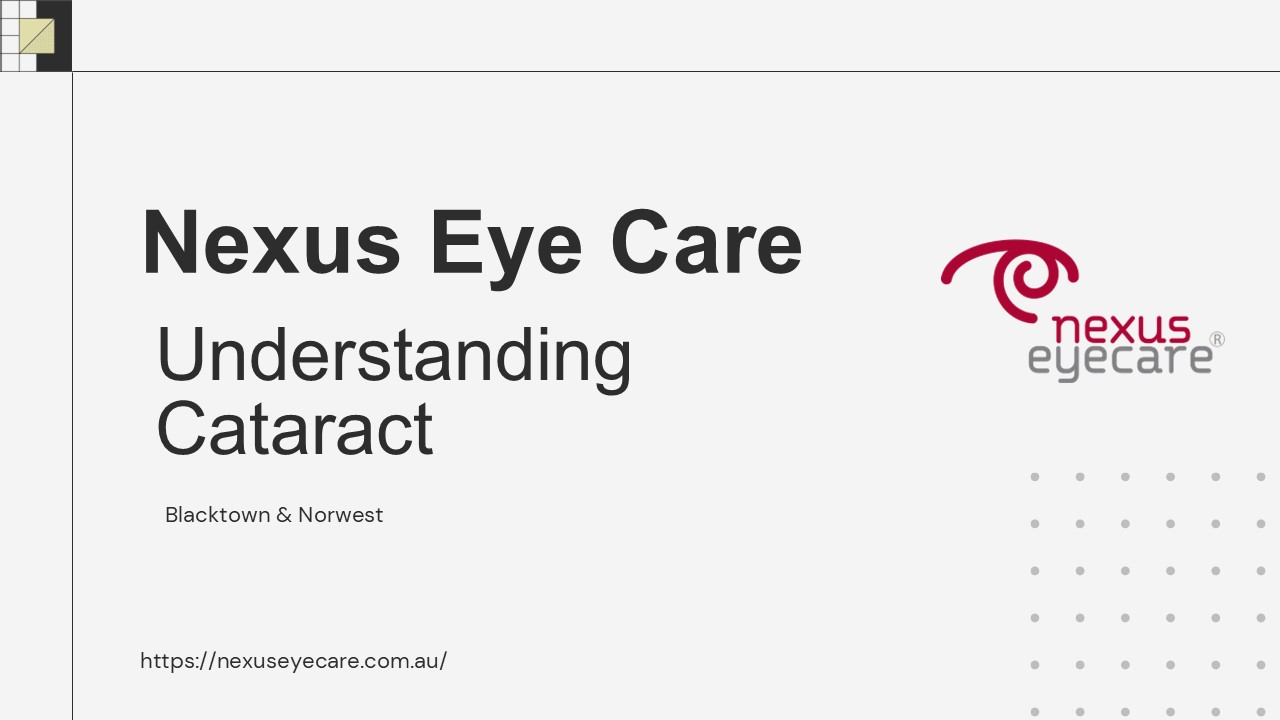Understanding Cataract - Symptoms & Treatment - Nexus Eye Care - PowerPoint PPT Presentation
Title:
Understanding Cataract - Symptoms & Treatment - Nexus Eye Care
Description:
Understanding Cataracts: Learn about the symptoms, causes, and advanced treatment options available at Nexus Eye Care. Regain clear vision and improve your quality of life! – PowerPoint PPT presentation
Number of Views:1
Title: Understanding Cataract - Symptoms & Treatment - Nexus Eye Care
1
Nexus Eye Care
Understanding Cataract
Blacktown Norwest
https//nexuseyecare.com.au/
2
What is a Cataract?
A cataract occurs when the lens of the eye
becomes cloudy, leading to blurry vision and
difficulty performing daily tasks. While commonly
associated with aging, cataracts can also affect
children. Without treatment, they may result in
blindness.
Cataract surgery involves replacing the cloudy
lens with a clear, artificial one. This procedure
is performed by a cataract surgeon and is often
completed as a same-day outpatient surgery.
Cataract Surgery
https//nexuseyecare.com.au/
2
3
About Us
we are a dedicated team of eye specialists
committed to delivering exceptional care. With
our expert ophthalmologists, you can expect
personalised assessment and treatment for a wide
range of vision-threatening conditions, including
cataracts, macular degeneration, glaucoma,
oculoplastics, diabetic eye diseases, corneal
diseases, pterygium and paediatric eye diseases.
We operate at Lakeview Private Hospital, ensuring
convenient access to our comprehensive services.
https//nexuseyecare.com.au/
3
4
Who Is at Risk for Cataracts?
- Most common in individuals in their 70s or 80s
due to the natural aging process. - Can develop due to inherited syndromes or
complications from conditions like diabetes. - Eye injuries can lead to cataracts at an earlier
age. - Long-term use of corticosteroid medications
(e.g., prednisone). - Excessive exposure to sunlight (UV rays).
https//nexuseyecare.com.au/
4
5
Symptoms of Cataracts?
- Common symptoms of cataracts include
- Blurry or cloudy vision
- Faded colours
- Increased or extreme glare from lights
- Poor vision at night
- Difficulty with near vision or distance vision
- Seeing multiple images
- Frequent changes in eyeglass prescription
https//nexuseyecare.com.au/
5
6
Stages of Cataracts?
- Early stage No noticeable vision loss.
- Intermediate stage Vision becomes cloudy.
- Advanced stage Double vision, severe glare.
- Remember to consult an eye care professional for
accurate diagnosis and treatment options.
https//nexuseyecare.com.au/
6
7
Types of Cataracts?
- Nuclear Cataract Cloudiness occurs in the center
of the lens. - Cortical Cataract Cloudiness forms on the outer
edges of the lens, resembling white spokes. - Posterior Subcapsular Cataract Cloudiness
develops at the back of the lens capsule, often
progressing more quickly in individuals with
diabetes or those using long-term steroids.
https//nexuseyecare.com.au/
7
8
Treatment of Cataracts
- Cataract Surgery The only effective treatment
for cataracts. Eye drops, vitamins, or diet
cannot reverse the condition. - When to Consider Surgery Surgery is recommended
when cataracts begin to interfere with daily
activities like reading or driving. The procedure
is safe and performed under local anesthesia. - The Procedure The cloudy lens is removed and
replaced with a clear artificial lens, known as
an Intraocular Lens (IOL). - Choosing the Right IOL The appropriate lens is
selected using an A-scan, a special test that
measures the length of the eye for precise
fitting.
https//nexuseyecare.com.au/
8
9
Meet Our Expert
Dr. Chameen Samarawickrama
Dr Phillip Myers
Dr Kiran Sindhu
Cataract Surgery, Paediatrics General
Ophthalmology
Cataract Surgery General Ophthalmology
Cornea, Refractive Cataract Surgery
9
10
Meet Us Below
Nexus Eye Care - Blacktown
Tel 02 9672 3055 Email reception_at_nexusblackto
wn.com.au
Nexus Eye Care - Norwest
Tel 02 9680 9100 Email reception_at_nexuseyecare
.com.au
https//nexuseyecare.com.au/































